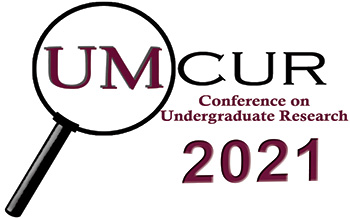Project Type
Presentation
Faculty Mentor’s Full Name
Laurie Minns
Faculty Mentor’s Department
Division of Biological Sciences
Abstract / Artist's Statement
Purpose: Female caregivers of patients with Glioblastoma Multiform suffer significant emotional, physical and financial burden. Additionally, these caregivers are not well educated or equipped to care for the high demands of a brain cancer patient whose condition declines rapidly and have inadequate support systems. In this study, solutions for particular caregiver burden issues are discussed and highlighted specifically to inform family members and friends ways to which they could provide better support systems for caregivers of GBM patients. Methods: Within this study, 102 letters were analyzed from female caregivers regarding their experiences with the various hardships associated with caring for a patient suffering from glioblastoma multiforme. These letters were approved by the UM IRB (#224-19) and informed consent was obtained. A subset of 70 letters, which mentioned family and friends providing secondary support, were further examined to better determine ways in which they could alleviate the intense stress female caregivers are under. Results: The most mentioned area of support needed from female caregivers with families was a deeper understanding and education of the cognitive decline their husbands would face, followed by the need for physical help for taking care of their husbands. In addition to these two areas, female caregivers talked about having more emotional support after their husbands passed away for both themselves and other family affected. However, female caregivers with medical experience either themselves or from a family member had a better outlook on their ability to properly care for their husband and felt more supported as compared to those who were just receiving information from their own research and medical professionals. With this information on common burdens GBM caregivers face, it is clear that if family members and friends are able to provide help with educating or researching GBM, assist with the physical aspects of caregiving and or emotional support after the hardship caregiver burden would significantly decrease. Conclusion: Glioblastoma multiforme causes significant reliance on caregivers for emotional and physical support, affecting more than just the patient diagnosed, quality of life for all parties involved declines steeply and this study looks to find way to improve and educate more people on this tremendous issue.
Category
Social Sciences
Glioblastoma Multiforme Caregiver Burden with Family and Friends Present
Purpose: Female caregivers of patients with Glioblastoma Multiform suffer significant emotional, physical and financial burden. Additionally, these caregivers are not well educated or equipped to care for the high demands of a brain cancer patient whose condition declines rapidly and have inadequate support systems. In this study, solutions for particular caregiver burden issues are discussed and highlighted specifically to inform family members and friends ways to which they could provide better support systems for caregivers of GBM patients. Methods: Within this study, 102 letters were analyzed from female caregivers regarding their experiences with the various hardships associated with caring for a patient suffering from glioblastoma multiforme. These letters were approved by the UM IRB (#224-19) and informed consent was obtained. A subset of 70 letters, which mentioned family and friends providing secondary support, were further examined to better determine ways in which they could alleviate the intense stress female caregivers are under. Results: The most mentioned area of support needed from female caregivers with families was a deeper understanding and education of the cognitive decline their husbands would face, followed by the need for physical help for taking care of their husbands. In addition to these two areas, female caregivers talked about having more emotional support after their husbands passed away for both themselves and other family affected. However, female caregivers with medical experience either themselves or from a family member had a better outlook on their ability to properly care for their husband and felt more supported as compared to those who were just receiving information from their own research and medical professionals. With this information on common burdens GBM caregivers face, it is clear that if family members and friends are able to provide help with educating or researching GBM, assist with the physical aspects of caregiving and or emotional support after the hardship caregiver burden would significantly decrease. Conclusion: Glioblastoma multiforme causes significant reliance on caregivers for emotional and physical support, affecting more than just the patient diagnosed, quality of life for all parties involved declines steeply and this study looks to find way to improve and educate more people on this tremendous issue.
